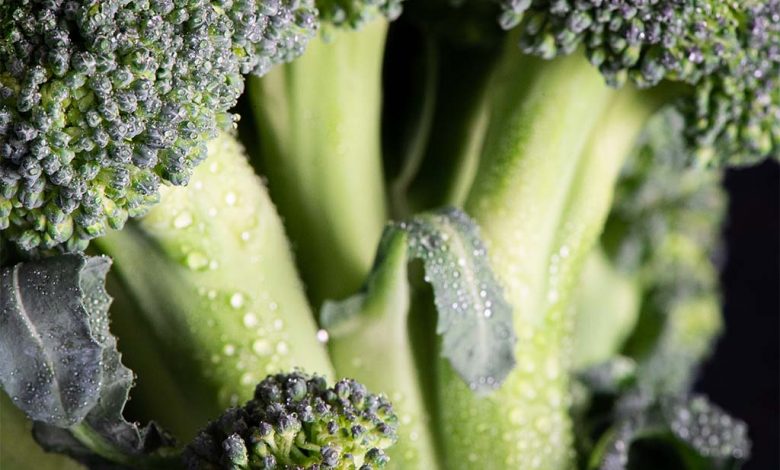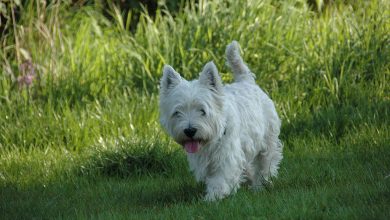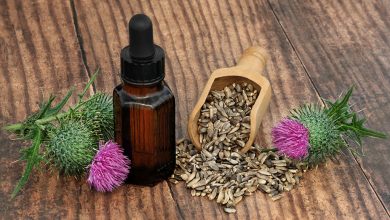Pancreatitis in dogs is a growing problem in the UK. In this comprehensive guide, we help you to understand exactly what it is, what causes pancreatitis, and we walk you through how to help your Westie manage its pancreatitis.

What is pancreatitis in dogs?
Pancreatitis in dogs is a common condition. The role of the pancreas is to produce enzymes that assist with the digestion of food, as well as the production of hormones such as insulin. Pancreatitis is the inflammation of the pancreas and there are two types of this condition: acute and chronic.
Acute vs chronic pancreatitis
Acute pancreatitis in dogs is short-term with a quick onset. It can be very painful with significant digestive upset, causing vomiting and diarrhoea, which can even result in dehydration and collapse in dogs.
Chronic pancreatitis in dogs is where they have previously had acute episodes that have caused damage to the pancreas.
This means that ongoing flare-ups and long-term issues are displayed, including an inability to digest foods properly and ultimately, a chronic inflammation within that area of the gut.
Pancreatitis can affect any breed of dog; however it is seen to be present in certain types of breeds more commonly than others. Westies, Jack russells, and some of the toy breeds such as bichon frise and poodles often fall into this category.
However, it is unclear whether this is because these breeds experience inflammation and therefore are predisposed to certain conditions.
For example, Westies are predisposed to skin problems and general immune-mediated conditions, which could result in inflammation throughout the body, including the pancreas.
It is important to be aware that any breed of dog can develop pancreatitis and if any of the symptoms are present, dogs should be examined by a professional so it can be managed.
Pancreatitis in older dogs
Pancreatitis is more common in middle-age to older dogs, however it can also occur in younger dogs. Whatever the age of a dog, if they display signs of pancreatitis, it is vital to seek veterinary advice as soon as possible.

Pancreatitis in overweight dogs
It is believed that overweight dogs may be more prone to pancreatitis in some cases, however it can also occur in dogs that are of a healthy weight.
The link between obesity and pancreatitis in dogs could be because overweight dogs may have been fed diets that are more likely to cause inflammation, therefore provoking the onset of pancreatitis.
Symptoms of pancreatitis in dogs
The following symptoms of pancreatitis will help you to identify if you need to speak to your Vet.
Bowel habits
One of the easiest and most revealing symptoms of pancreatitis in dogs is a change in bowel habits.
A common symptom is larger stools, or more of an oily appearance in the stool because of the lack of fat digestion. If a dog has diarrhoea, it is also worth investigating whether it is pancreatitis in dogs, or there is a different cause, as it needs to be dealt with.
Other symptoms of pancreatitis in dogs include:
Change in appetite
Weight loss
Abdominal pain or discomfort
Nausea or dehydration
What causes pancreatitis in dogs?
One single cause has not been isolated for pancreatitis in dogs.
We do know that if a dog experiences concurrent inflammation elsewhere, within the small intestine, bile ducts and liver, they can get pancreatitis included in that condition called triaditis.
This is inflammation in the small intestine, liver, and pancreas, which ultimately leads us to believe that anything that can include inflammation in the intestinal tract could lead to pancreatitis becoming a problem.
Previously, it was thought that it was caused by excess fat or excess oxidised fats. We now know it is more complex than this and it is more of a jigsaw of factors. It’s not always the consumption of fats that pump fats into the bloodstream.
We know that some of the cereals and starches that are then processed by the liver are actually the ones that produce the triglycerides which can aggravate the pancreas.
Digestive enzymes that are produced in the pancreas are supposed to travel into the dog’s gut to digest food. Instead, they become trapped in the pancreas and start to dissolve, digest, or inflame the pancreas itself. The digestion of its own organ then causes the inflammation. It becomes a vicious cycle of more digestion, more inflammation, and more activation of those enzymes, which goes in a circle and turns into a very painful condition.
Dr Emily Stein shared that the number one cause of pancreatic cancer in humans is a specific bacteria called porphyromonas gingivalis.
It is believed that if this bacterium is in your dog’s mouth as they have tooth decay or inflamed gums, these bacteria can travel down the airways, through the bloodstream and to the pancreas, contributing to inflammation. Every time they eat, if they have gingivitis, it is transmitted straight into the bloodstream.
We also know that almost all grains cause inflammation in humans because they release something called zonulin, which creates leaky gut. Applying this knowledge to dogs, grains could increase the likelihood of inflammation, as leaky gut causes the fragments around the bacteria to go into the bloodstream.
Things that can contribute to pancreatitis include:
- Sensitivities to certain foods
- Inflammation in the body (skin flare-ups, ear issues, dermatitis, gingivitis etc. which can signal an issue that needs dealing with)

How will a vet diagnose pancreatitis?
There are various methods that a vet may use to diagnose pancreatitis in dogs.
Examination
Pancreatitis is incredibly painful, so a Vet will place their hands on the abdomen of a dog and the dog will often tense up, or even yelp out with very little pressure. This is a common sign of pancreatitis.
Blood tests
Blood tests can be run to look at whether there is an increase of pancreas enzymes circulating in the bloodstream to indicate pancreatitis.
Vets will ask questions as well as carrying out physical examinations in order to understand the dog’s health and differentiate from other potential conditions that could be causing the symptoms.
Questions that a Vet might ask you about pancreatitis include:
What are the symptoms?
This will help to diagnose and rule out any other conditions, for example, whether they have been vomiting or if there has been any loss of blood.
What is your dog’s history?
A Vet will need to understand your dog’s history, to gain a deeper understanding of any contributing factors, as well as finding out whether they could have been suffering from pancreatitis for a long time.
Are there any foods your dog does not respond well to?
Vets will want to know about any intolerances or allergies, to understand whether food could be a contributing factor to inflammation, discomfort, or pancreatitis.
What has your dog eaten recently?
There may be unknown intolerances or allergies that are causing pancreatitis, so a Vet will often want to know which foods your dog has recently consumed. This can be an effective method of identifying any unfamiliar foods and seeing if these could be the cause of recent symptoms.
How to manage pancreatitis in dogs
When a dog has been diagnosed with pancreatitis, there are various ways that you can help to manage it.
What to avoid
Avoid fats in the acute phase
In the acute phase, avoid high fat content in food, as this stimulates the pancreas to create more enzymes which could be activated and cause more pain within the pancreas. This means feeding a healthy, balanced diet and low-fat dog treats for pancreatitis are great ways to manage health concerns.
Large meals
Instead of feeding large meals, opt for smaller portions. Breaking the same amount of food into smaller meals throughout the day can help to reduce the symptoms of pancreatitis and help to improve digestion.
Avoid foods that aggravate pancreatitis
Nutrition plays a key role in managing pancreatitis in dogs. Therefore, you should make sure you feed a good dog food for pancreatitis, ensuring it is nutrient-dense and does not contain ingredients like grains that are likely to cause further inflammation.
Avoid anything causing further health issues
Overall health is also important when managing pancreatitis, so food for dogs with pancreatitis should be easily digestible and should not risk any further health problems.
What to start doing
There are some additions to a dog’s diet that can be helpful to combat and cope with pancreatitis, whether it is acute or chronic. As with anything, if you are unsure or have any concerns, you should always check with your Vet before trying something new.
Support the gut
In the acute phase, feeding some bone broth with the fat skimmed off can help to support gut health and bacteria, reducing inflammation and getting flare-ups back under control. This works to allow the dog to take in nutrients without triggering the enzymes in the short-term.
Consider supplements
Supplements such as probiotics can help to support healthy digestion and a healthy gut.
Feed a suitable diet
The best food for dogs with pancreatitis is one that is nutritious and easily digestible, helping to keep inflammation away while supporting dogs’ health.
Knowing what to feed a dog with pancreatitis and how to manage their health issues is incredibly important, helping them to be comfortable and live the longest and healthiest lives possible. We answer some of the most popular questions about pancreatitis in dogs.
What is the best dog food for pancreatitis?
Knowing what to feed a dog with pancreatitis is important, as you can help to support their wellbeing and stabilise gut bacteria. A common question asked about the diet for dogs with pancreatitis is ‘should dogs with pancreatitis eat boiled chicken and rice?’ While this food has previously been classed as a ‘light’ diet, we also know that highly processed diets are not great for dogs. While rice may give a short-term fix in dogs’ glucose, large amounts of starch and rice have the potential to cause inflammation, further aggravating the condition in the longer term.
This means that an ideal dog pancreatitis diet is one that is species-appropriate, helping to support the reduction of inflammation while maintaining health. Therefore, a good food for dogs with pancreatitis revolves around higher fats and protein levels within the diet, more animal-originated sourcing of nutrients and a small amount of vegetable material to mimic the nutrients and vitamins that they could get from those prey animals.
Can I give my Westie healthy treats?
Particularly in the acute phase of pancreatitis, it is important to reduce the fat intake in your Westie’s diet.
What do Vets prescribe for pancreatitis?
Common treatment for pancreatitis involves supportive care. This includes fluid therapy, nutritional management and anti-nausea medications or appetite stimulants.
What can trigger pancreatitis?
There are a range of theories linked to the causes of pancreatitis in dogs. It is believed that dogs consuming unsuitable diets, for example, one full of cereals and starches, can result in the production of triglycerides which aggravate the pancreas. Food sensitivities and inflammation in the body are both factors that can contribute to pancreatitis in dogs.
How long do dogs live after being diagnosed with pancreatitis?
The prognosis and survival rate of dogs with pancreatitis is good, providing it is not severe and that it is controlled as much as possible. However, in cases of severe pancreatitis, the likelihood of fatality within 30 days is higher. It is very difficult to predict the lifespan of a dog with pancreatitis, as it depends on many factors including the causes, contributing factors and potential ways to improve the dog’s health.
How do I know if my dog food is good for pancreatitis?
The key to knowing the best diet for dogs with pancreatitis is to be aware of the ingredients. You should be able to find out everything that is included in a dog’s meals, and this can be used to check whether it is likely to support a healthy gut and digestion or cause further inflammation in dogs with pancreatitis. To find a dog food suitable for pancreatitis, you can speak to your vet, or talk to a nutritionist.
For more information visit: www.bellandduke.com






